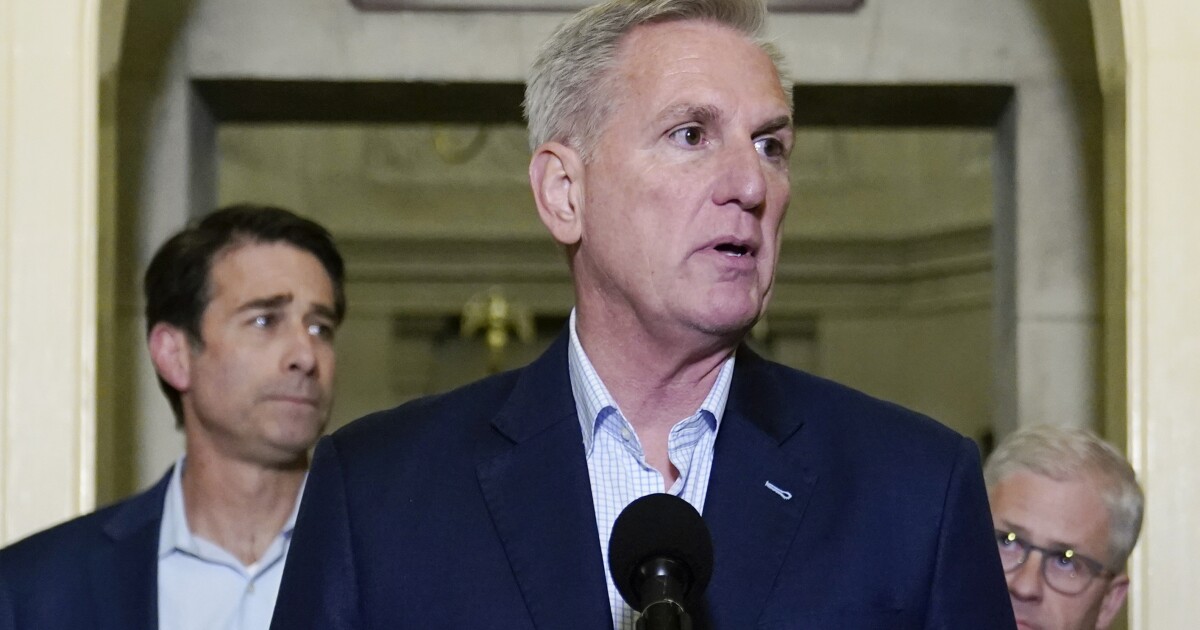

House Speaker Kevin McCarthy (R-CA) and President Joe Biden’s deal in principle to avert a debt default raises the debt ceiling for two years, rolls back non-defense discretionary spending to Fiscal Year 2022 levels, and caps top-line federal spending to one-percent annual growth over the next six years.
The deal would raise the debt ceiling until January of 2025, claw back nearly $29 billion in unspent COVID relief funds, add work requirements to Temporary Assistance for Needy Families program and the Supplemental Nutrition Assistance Program up to age 54, according to a GOP fact sheet on the bill and Reps. Dusty Johnson (R-SD) and Stephanie Bice (R-OK). It would also claw back the $1.9 billion appropriated to the Internal Revenue Service for the 87,000 new agents, implement a 99% continuing resolution spending limit cap until all 12 appropriations bills are passed, and would restart student loan payments in 60-days.
YELLEN SETS NEW DEBT CEILING ‘X-DATE,’ GIVING NEGOTIATORS MORE BREATHING ROOM
Additionally, it would enact a statutory Administrative PAY-GO requiring the administration to find ways to offset spending from executive orders and rules.
Despite pushback on social media by some members of the conservative House Freedom Caucus, Rep. Dusty Johnson (R-SD) told reporters as he left the Capitol that he believes a majority of Republicans will vote for the bill when it gets to the House floor.
“I don’t know how we couldn’t have a strong majority,” Johnson said. “Look at the omnibus. The overwhelming majority of House Republicans voted against it because that was a $700 billion spender. It increased the deficit by that much. Compare that to this, which will reduce, in the 10-year window, the debt by $1.4 trillion. This gets rid of the omnibus by double.”
As he left the Capitol, McCarthy told CNN that he thought the conference call with GOP House Members went “really well” and they will be working through the night to get the language finalized. He said the bill would likely be about 150 pages, and he plans to talk to Biden tomorrow while their teams work on the text.
McCarthy also pushed back on the dissent from members of the Freedom Caucus, saying he thinks there will be many more people “excited than depressed on this.”
“Most importantly, America wins on this one,” McCarthy said.
In a statement, Biden called the tentative agreement an “important step forward” and urged both chambers of Congress to pass the bill “right away.”
CLICK HERE TO READ MORE FROM THE WASHINGTON EXAMINER
“The agreement represents a compromise, which means not everyone gets what they want. That’s the responsibility of governing,” Biden said in the statement. “And, this agreement is good news for the American people, because it prevents what could have been a catastrophic default and would have led to an economic recession, retirement accounts devastated, and millions of jobs lost.”
McCarthy said he plans to file the bill Sunday afternoon and call his members back on Tuesday so they can vote on it Wednesday. This will then give the Senate five days to pass the bill and get it to the President’s desk before the June 5 deadline to raise the debt ceiling.







